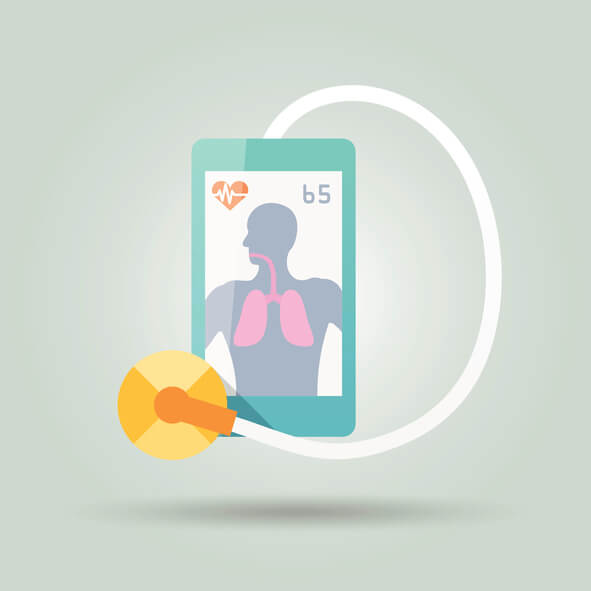The growth of mobile health
mHealth is the medical and health practice that allows people to access quality healthcare services through software applications installed on their mobile devices such as smartphones, patient monitoring devices, personal digital assistants (PDAs) etc. It is used for disease surveillance, treatment support, diagnosing ailments and tracking medical progress for patients.
As the world turns to advanced digital technology, medical records are stored in highly sophisticated databases and systems as a way to improve efficiency and performance. Therefore, the presence of several mHealth apps in the market is attributed to the increased number of mHealth app publishers and the importance of multi-platform app domains among users and medical professionals.
Medisafe, ChronicCareIQ and WebMD Symptom Checker are some of the best mHealth apps in the market. Medisafe is a medical management app that ensures patients schedule their respective pill dosage according to the amount and time to take their prescribed drugs. WebMD symptom checker app provides symptoms to both children and adults based on the information input by the user. It diagnosis the patient’s ailing body for remedy and cure.
The mHealth app market is estimated to be worth 28.32 billion and it is expected to rise to 102.35 billion by 2023.

Image courtesy of Statista
| Recommended for you | |
| US healthcare startup launches mobile app to identify skin disease | |
| Mobile app to track eye disease progression launched | |
| 10 Successful mHealth apps in Africa |
Developing a mobile health application
mHealth app developers create applications based on the universal demands of the health sector or according to the specific needs of the patient or hospital. Therefore, app developers can create both web-based and native mHealth applications that can be used to improve the quality of health care among patients.
Developers can create apps for Android, iOS, and Windows operating systems depending on the requirements of the end users in healthcare markets. App developers should create applications from scratch because there are constant changes in the health sector which requires new and advanced applications that can resolve these problems and challenges. Apps built from scratch are more objective because they are developed to meet a certain demand among users and provide the needed service that clients expect.
The cost of developing a mHealth app costs approximately $425,000 because of hiring third party developers or freelancers.
Since these apps require real-time data and provide instant medical feedback, results and treatment plans, the costs to develop them is based on the integration of Artificial Intelligence and other functionality such as machine learning techniques which are incorporated on the apps.
APIs provide an environment for app developers to create software applications suited to the meet the demands of the customers and provide a certain service to application users. Moreover, it allows testing the developed applications to ensure that they are effective and ready to be used.
Human API is one of the best APIs because it provides services such as review prescription, manage patient data and provide test results. Box API is a service product that is integrated with healthcare apps to store and share medical records and prescription data. Doximity is an API that connects patients and doctors. It conducts professional qualification and background checks for doctors who subscribe to the platform.
The APIs used in telemedicine include the WebRTC which offers transmission capabilities over the internet enabling video and audio features between doctors and patients.
Healthchat API allows users to add telehealth functionalities in mobile devices that support android and iOS. In addition, it allows doctors, nurses and patients to communicate effectively while preserving privacy and accountability. Infermedica is the best API for AI diagnostic because its used for medical diagnosis among patients easing the process of medical checkups. Symptom Checker API is used to checks for symptoms among patients through the use of AI technology.
Zweena is a healthcare analytic API that provides medical data from all healthcare providers in the country into a centralised location. It’s used for analysing the collected information to allow doctors to conduct a tests and examinations with the full understanding of how the patient will respond to treatment.
DrugPatentWatch is an API that hosts analytical data of medical drugs that protects the patent rights for drug companies all over the world.
Also, Google Cloud for Healthcare is a cloud platform provided by Google that allows the universal sharing of medical data among medical professionals while maintaining data security.
5 challenges in developing a digital health, mHealth app
Healthcare apps are different from traditional apps because they offer users the communication capabilities whereby they can interact with their doctors and health specialists with the help of audio and video capabilities. Moreover, these apps are integrated with hospital information systems which means that users can easily access their medical data which are stored in Electronic Health Records (EHR) databases.
Health apps provide users with simple to use tools for patients to track and organize their medical status. More importantly, these apps act as informational resources whereby they can access books, magazines, and guidelines to learn more about the prescribed drugs and their respective side effects and results.
These apps allow patients to manage their own health through patient portals that gives each patient his or her personal domain to track their diagnosis, symptoms and treatments in real time.
1. Patient privacy
Healthcare app developers are faced with privacy and authentication challenges because they have direct access to patient data and information which might be personal and private. mHealth app stores ePHI (Personal Health Information) in digital format, there is a rising concern that this data might be used without the patient’s consent.
Since app developers are sometimes questioned about their integrity levels, collecting of data is a major concern in the healthcare industry. This is because apps sometimes require a user’s information such as name, age and gender and in some scenarios the app requires access to the device’s features and data stored in the memory partition.
2. Compliance with the HIPAA rules and regulations that affect app development
The compliant development process is a challenging requirement for app developers because it requires them to design the specific healthcare app based on the HIPAA rules and regulations. Thus, this interferes with the development process because it restraints developers from being creative and explore the possibility of creating applications that can resolve patients’ problems and challenges.
Furthermore, it limits their creative power because they are mandated to develop apps within the confines of the HIPAA policies.
3. FDA Regulations
There are apps that promote unhealthy lifestyles which have been shut down by by regulatory bodies like the FDA that banned the use of pro-smoking apps in North America. These regulations stated that these apps violated public health laws that mandate apps should improve the quality of life of all its users.
However, on the upside, FDA regulations have app developers to transform electronic devices into regulated medical service that offer tracking services for diet, nutrition, medication and exercise.
4. Cloud Integration
Cloud adoption is the major technical challenge for app developers because of security concerns about cloud platforms. Some of these cloud-based storage databases cannot be properly secured when it comes to preserving patients’ data and informations.
5. Compatibility with legacy medical systems
Modern apps face incompatibility challenges with archaic enterprise systems in hospitals. Legacy systems are not compatible with advanced healthcare apps which makes it hard for these apps to provide services to hospitals and medical centers that still operate using outdated technology.
Conclusion
As the world quickly turns to advanced digital technology to solve most of the current problems affecting the healthcare industry, technology firms are developing medical apps designed to provide medical services to users without necessarily going for a consultation, diagnosis, or checkups at the hospital.
This article provides a well-detailed description of the advantages of medical apps as well as the regulations used to ensure that these apps do not violate privacy rights of patients and doctors. The fact that medical apps can be installed in mobile devices, patients can access their medical data and track their progress in real time without being admitted to the hospital.
App developers have faced public backlash because of a few companies that misuse these apps to access confidential data without the patient’s approval.
In some cases, developers have been criticised for developing high-end apps for certain operating systems (iOS, Android) and disregarding other mobile platforms (blackberry).
Image credit: www.istockphoto.com

















